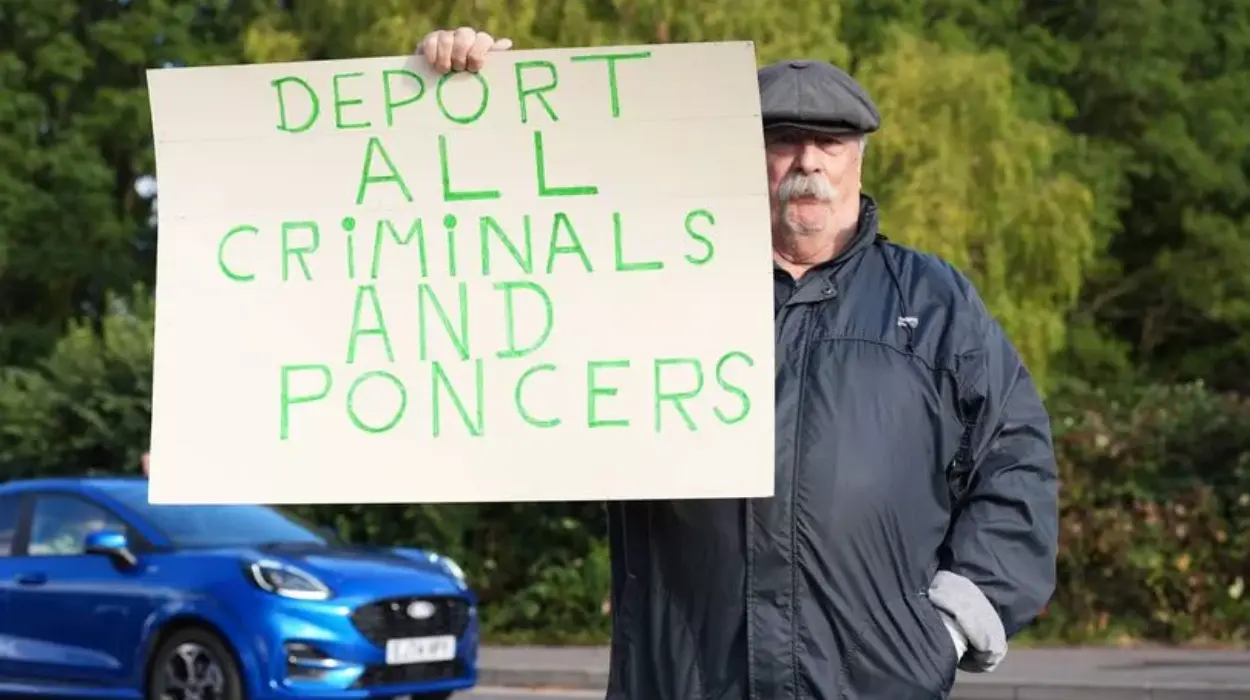Key Points
- The UK government won a court appeal allowing asylum seekers to remain in the Bell Hotel in Epping, East London, overturning a previous High Court injunction.
- The Bell Hotel became a focal point for violent protests after an asylum seeker was charged with sexual assault of a 14-year-old girl.
- Ministers including the Minister of State for Security Dan Jarvis and Minister for Asylum Angela Eagle defended the decision to appeal and keep asylum hotels open in a controlled manner.
- Protests against asylum hotels have spread across the UK in cities including London, Bristol, Liverpool, Birmingham, and others, with anti-migrant demonstrators facing counter-protesters.
- Police intervened in several protests, leading to arrests and occasional scuffles.
- The government faces political pressure amid record numbers of asylum applications and migrants housed in hotels, reportedly over 32,000 across 200+ hotels nationwide.
- Opposition politicians, including Conservative leader Kemi Badenoch and Reform UK’s Nigel Farage, condemned the government’s stance, accusing it of prioritising asylum seekers’ rights over local residents’ safety.
- Legal battles continue as various local councils contemplate challenges, while the government seeks to close all asylum hotels by the next general election, targeted for 2029.
- The UK has seen unprecedented migrant arrivals via small boats crossing the Channel, pushing asylum demand higher.
- The government emphasises its legal obligations under the European Convention on Human Rights to provide shelter to asylum seekers facing homelessness.
- Nigel Farage’s recent proposal to repeal human rights legislation to enable mass deportations has attracted attention but faces criticism from legal experts.
What was the recent court ruling about the East London asylum hotel?
As reported by Reuters on August 29, 2025, the British government won an appeal in the Court of Appeal which overturned a previous High Court injunction that had required the temporary eviction of asylum seekers from the Bell Hotel in Epping, about 20 miles northeast of London. This hotel had been central to protests after an Ethiopian asylum seeker residing there was charged with sexual assault of a minor. The Court of Appeal ruling was based on planning issues and revoked the injunction, allowing asylum seekers to remain while the government pursues its objective of controlled closures of such hotels. David Bean, one of the appeal judges, warned that permitting protests to obtain injunctions could encourage further lawlessness.
- Key Points
- What was the recent court ruling about the East London asylum hotel?
- Why has the Bell Hotel in Epping become a focus of protests?
- How have the UK government ministers responded to the protests and legal battles?
- What has been the scale and impact of protests across the UK?
- What are the current statistics on asylum seekers housed in hotels and asylum applications in the UK?
- What political pressures are ministers facing regarding asylum policies?
- What are the government’s longer-term plans concerning asylum hotels?
Why has the Bell Hotel in Epping become a focus of protests?
The Bell Hotel has drawn significant public attention and protests because it became the residence of an asylum seeker charged with sexually assaulting a 14-year-old girl. This incident sparked waves of anti-immigration demonstrations, some violent, with local residents and activists rallying against the presence of asylum seekers there. According to coverage by The Guardian and CNN, demonstrations in Epping and other UK cities intensified, featuring groups carrying British flags and anti-immigration messages such as “Stop the boats” and “Epping says no.” These protests have often been met with counter-demonstrations by anti-racism and pro-migrant advocates, leading to police interventions to prevent clashes.
How have the UK government ministers responded to the protests and legal battles?
Minister of State for Security Dan Jarvis stated that the government intends to appeal rulings against asylum hotels and stressed the need to close all such hotels by the end of the current parliament “in a controlled and organised manner,” emphasising preventing chaos seen in previous years. Angela Eagle, Minister for Asylum, described the inherited asylum accommodation system as disorganised and costly, affirming the appeal was necessary to ensure orderly closure of hotels like the Bell and avoid disruption from unplanned evictions costing the government around £9 million daily. The Home Secretary, Yvette Cooper, also reiterated commitment to a “properly managed” approach to phasing out asylum hotels.
What has been the scale and impact of protests across the UK?
Protests have been widespread, taking place not only in East London but also in Bristol, Liverpool, Birmingham, Mold in Wales, Perth in Scotland, and County Antrim in Northern Ireland. Anti-migrant demonstrators often face counter-protesters advocating for asylum seekers’ rights, necessitating law enforcement deployments to maintain order. Reports from BBC and other outlets noted arrests during protests, including in Liverpool where 11 individuals were detained for offenses ranging from public intoxication to assault. Bristol police reported attempts by protesters to breach lines separating opposing groups. The protests reflect sharp divisions in public opinion about immigration and asylum policies amid growing migrant arrivals.
What are the current statistics on asylum seekers housed in hotels and asylum applications in the UK?
According to official Home Office data cited by Al-Jazeera and others, by the end of March 2025, approximately 32,345 asylum seekers were housed temporarily in hotels across the UK. The total number of asylum applications had reached a record high of 111,084 by the end of June. Many asylum seekers are unable to work legally and rely on government assistance or family support for housing and basic needs. The UK has seen over 50,000 migrants cross the English Channel since Prime Minister Keir Starmer took office, often in small, unsafe boats, contributing to the pressure on the asylum system.
What political pressures are ministers facing regarding asylum policies?
The Labour government under Prime Minister Keir Starmer is under scrutiny for its immigration strategy, with critics accusing it of valuing asylum seekers’ rights over public safety. Conservative leader Kemi Badenoch accused Starmer of prioritising “illegal immigrants” ahead of British citizens’ security. Nigel Farage, leading the Reform UK party and currently prominent in polls, proposed repealing human rights laws to enable large-scale deportations, a plan heavily criticised as impractical by legal experts but which has raised public debate. The government faces balancing humanitarian obligations with political and public concerns about immigration levels, safety, and community cohesion.
What are the government’s longer-term plans concerning asylum hotels?
The UK government aims to close all asylum hotels by the next general election scheduled for 2029. Currently, more than 200 hotels house over 32,000 migrants nationwide. Ministers have emphasised that closures must be done ‘in a controlled and orderly manner’ to avoid exacerbating homelessness among asylum seekers and manage the large numbers still awaiting decisions on their claims. The government also underscores its legal obligation under the European Convention on Human Rights to provide shelter to those facing homelessness while their applications are processed.



